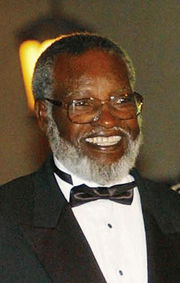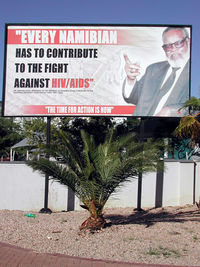Sam Nujoma
| Sam Nujoma | |
 |
|
|
1st President of Namibia
|
|
|---|---|
| In office 21 March 1990 – 21 March 2005 |
|
| Preceded by | None |
| Succeeded by | Hifikepunye Pohamba |
|
|
|
| Born | 12 May 1929 Ongandjera, Namibia |
| Political party | SWAPO |
| Spouse(s) | Kovambo Theopoldine Katjimune (m. 1956) [2] |
| Children | Utoni Daniel (1952), John Ndeshipanda (1955), Sakaria Nefungo (1957) and Nelago (1959) [3] |
Samuel Daniel Shafiishuna Nujoma (born 12 May 1929 in Ongandjera, South West Africa (now Omusati Region)) was the first President of Namibia. He was inaugurated as President on 21 March 1990 and was subsequently re-elected in 1994 and 1999, serving until 2005. He was also President of the South-West Africa People's Organisation (SWAPO) from its founding in 1960 until 2007.
Contents |
Early life
Nujoma was born in the north of the country, in Ongandjera, which is part of the cultural area known as Ovamboland. His mother, Kuku Helvi-Mpingana Kondombombolo, died on 26 November 2008 at the age of 108. She was known as the "Grandmother of the Nation.[1]
President of SWAPO
| http://www.klausdierks.com/images/Nujoma_1960s.jpg Sam Nujoma (right) with Bishop Colin Winter and Shapua Kaukungua, 1960s. Original source: Namibia State Archive. | |
In 1960 he became the first President of the South-West Africa People's Organisation (SWAPO), having co-founded its forerunner, the Ovamboland People's Organization, in the late 1950s. At the time South Africa administered the land under a policy of apartheid, in which the best resources were reserved for those classified white, while other Namibians were treated as inferior and forbidden from active participation in their country. After years of asking the United Nations to ensure the occupying power South Africa released control of South West Africa, he authorized armed resistance in 1966. This began the Namibian War of Independence, which lasted 24 years.
During the struggle, Nujoma took the combat name "Shafiishuna", meaning "lightning", as the name was in his family on his father's side.[2]
At first the South African military dealt with SWAPO while simultaneously being busy with military campaigns in other countries, but later suffered a serious setback at the Battle of Cuito Cuanavale which led to the independence of Namibia, as well as accelerating the end of South Africa's white-run apartheid regime.
President of Namibia

As head of SWAPO, Nujoma was unanimously declared president upon the victory of SWAPO in a United Nations-supervised election in 1989, and was sworn in by UN Secretary-General Javier Pérez de Cuéllar on 21 March 1990.
In 1992, Norway decided to stop drought relief to Namibia in response to the purchase of an expensive new presidential jet and two new VIP helicopters. The planes were bought just few weeks after Sam Nujoma had appealed to the international community for drought aid.[3] Many years later, Nujoma is still being criticized for excessive luxury and perks he gets at the cost of Namibian state, that is applying for the status of least developed country[4].
Nujoma initiated a plan for land reform, in which land would be redistributed from whites (who, despite constituting only a small percentage of the population, own a disproportionately large amount of the nation's farmland) to blacks, although it is being implemented on a more gradual and long-term basis than in nearby Zimbabwe. Nujoma has been vocal in his support for Zimbabwe and its president, Robert Mugabe, in the face of the criticism the Zimbabwean government has received from the West for its land reform program. Since 2003, Zimbabwe's land reform programs have resulted in white farmers' lands being seized without compensation.
Nujoma was re-elected as President of Namibia in December 1994 with 76.3% of the vote.[5] The constitution of Namibia was changed to allow Nujoma to run for a third five-year term in 1999; this was justified on the grounds that he had not been directly elected for his first term, and the change applied only to Nujoma. He won the 1999 election with 76.8% of the vote.[5] The constitution did not allow Nujoma to run in November 2004 for a fourth term, and there was not much enthusiasm even within SWAPO to change it again. Hifikepunye Pohamba, described by some as Nujoma's "hand-picked successor", was elected as the candidate for the presidential election during the SWAPO congress held on the 30 May 2004, defeating two other candidates, Nahas Angula and Hidipo Hamutenya. The latter had been dismissed from his post of Foreign Affairs minister by Nujoma barely two days before the congress. Pohamba was elected with a large majority and was sworn in on 21 March 2005.
Post-presidency
While Pohamba replaced Nujoma as the President of Namibia, Nujoma stayed on as President of SWAPO.[6] There was speculation that he would be re-elected as SWAPO leader in 2007 and that he was planning to run for president again in 2009.[7] In early October 2007, however, Nujoma said that he had no intention of seeking re-election as SWAPO President and would stand aside in favor of Pohamba, the Vice-President of SWAPO, later in the year, after 47 years as party leader.[8][9] Pohamba was accordingly elected unopposed as SWAPO President on 29 November 2007 at a party congress. Nujoma said that he was "passing the torch and mantle of leadership to comrade Pohamba".[10] The congress also decided to give Nujoma the title of Leader of the Namibian Revolution, in addition to his existing title, Founding Father of the Namibian Nation.[11] Choosing to leave active politics, Nujoma was not re-elected to the SWAPO Central Committee or the Politburo,[12] but the congress granted him permission to attend meetings of the Central Committee and Politburo "at his discretion". He may also receive the title of National Chairman of SWAPO.[11]
Nujoma's son Utoni Nujoma is Deputy Minister of Justice and was elected to the Central Committee and Politburo of SWAPO at its November 2007 congress.[11]
The director of the National Society for Human Rights (NSHR) in Namibia stated that Nujoma had connections to the CIA.[13] The organization has asked the International Criminal Court to investigate Nujoma and what they say is his role in disappearances during his term.[14]
In 2009, Sam Nujoma received his Master's degree in Geology from the University of Namibia.
Despite stepping down from a formal role, as of September 2009 Nujoma is still active in the political sphere, appearing at a SWAPO rally on the 19th to denounce Western imperialism in Africa, Iraq and Afghanistan, at which he also called for "anyone [who] find[s] an Englishman, do so, beat him up".[15] In response, The Namibian newspaper wrote in an editorial that his call was in contravention of Namibia's electoral Code of Conduct, Racial Discrimination Prohibition Act of 1991 and Constitution.[16]
See also
References
- ↑ Grandmother of the nation' passes away AllAfrica.com (originally published in The Namibian), 2008-11-27, accessed 2009-10-11
- ↑ Baffour Ankomah, Nujoma - 'No Fourth Term For Me', Swans, 17 November 2003.
- ↑ [1], 6 August 1992.
- ↑ http://www.hellonam.com/blogs/nshr/600-21-million-dollar-office-nujoma.html
- ↑ 5.0 5.1 Elections in Namibia, African Elections Database.
- ↑ "NAMIBIA: Election expected to be low-key", IRIN, 12 November 2004.
- ↑ John Grobler, "Play it again, Sam", Mail & Guardian Online (South Africa), 4 February 2007.
- ↑ "Former president Nujoma to quit active politics", African Press Agency, 2 October 2007.
- ↑ "Namibia's ex-president retires", AFP (News24.com), 3 October 2007.
- ↑ "Nujoma succeeded by Pohamba", AFP (IOL), 30 November 2007.
- ↑ 11.0 11.1 11.2 Brigitte Weidlich, "A title for Nujoma, brickbats for media", The Namibian, 3 December 2007.
- ↑ Christof Maletsky, "Swapo big names dropped", The Namibian, 3 December 2007.
- ↑ P. ya Nangoloh, An expose about Nujoma's CIA connections. Part 1, 7 February 2007.
- ↑ "Namibian group seeks ICC investigation of ex-leader". Reuters, republished on CNN.com (CNN). 2007-07-31. http://www.cnn.com/2007/WORLD/africa/07/31/namibia.nujoma.reut/index.html. Retrieved 2007-08-10.
- ↑ Founding Father Talks War Again AllAfrica.com (originally published in The Namibian), 2009-09-21, accessed 2009-10-11
- ↑ Nujoma Breaks The Rules AllAfrica.com (originally published in The Namibian), 2009-09-25, accessed 2009-10-11
Bibliography
- Sam Nujoma, Where Others Wavered, The Autobiography of Sam Nujoma, London 2001
External links
| Political offices | ||
|---|---|---|
| Preceded by Position created |
President of Namibia 1990 – 2005 |
Succeeded by Hifikepunye Pohamba |
|
|||||||